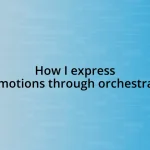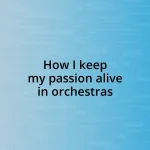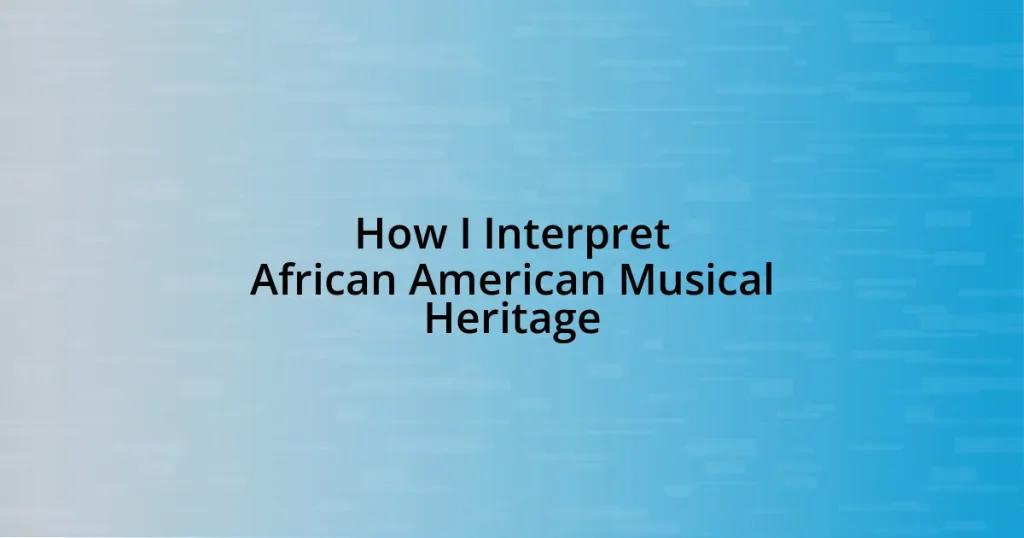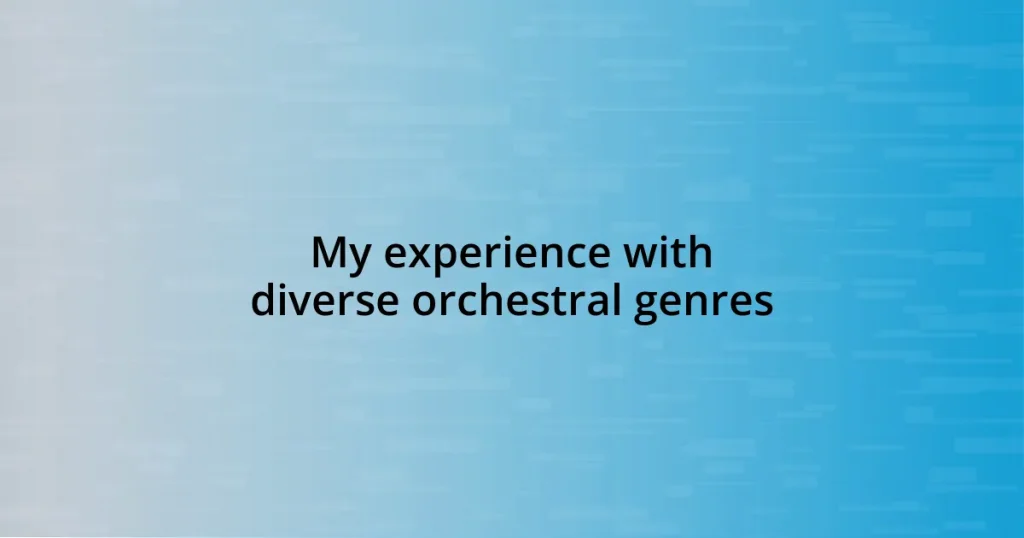Key takeaways:
- African American music reflects a rich history of triumphs and trials, serving as a powerful form of expression and identity.
- Key genres like blues, jazz, gospel, hip-hop, and R&B interconnect, each telling stories of struggle and resilience.
- Influential artists such as Billie Holiday, Tupac Shakur, and Aretha Franklin used their music to address social issues and inspire change.
- Modern interpretations and preservation efforts ensure the legacy of African American music evolves while honoring its roots, emphasizing education and community engagement.
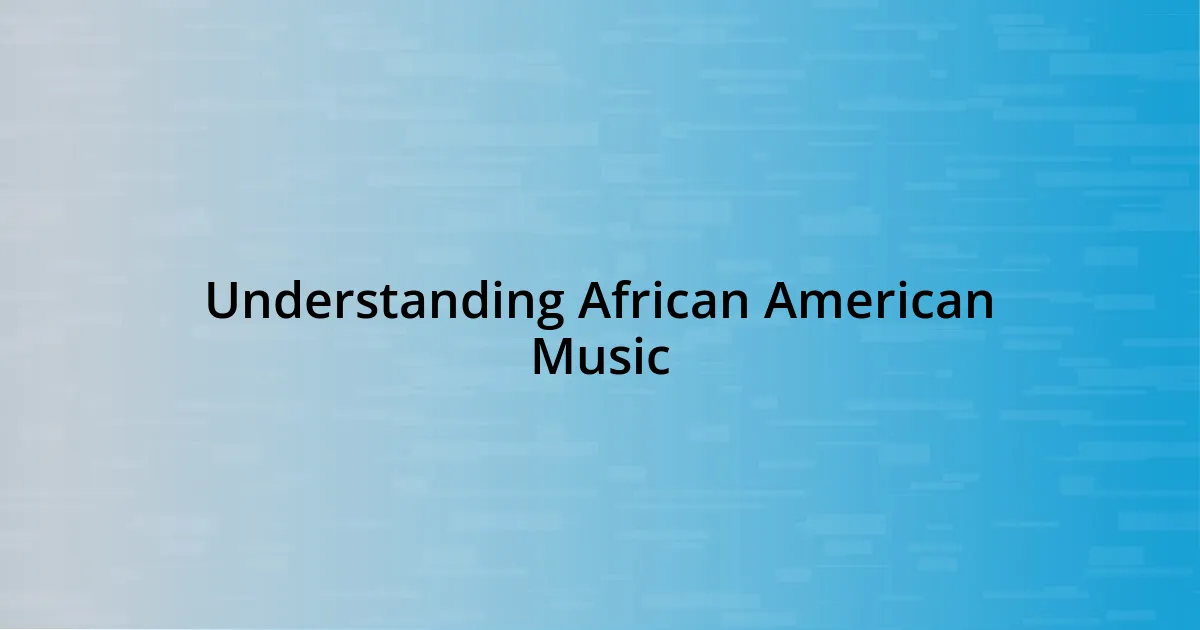
Understanding African American Music
African American music is a vibrant tapestry woven from a history filled with triumphs and trials. I remember attending a local blues festival, where the soulful sounds resonated with stories of hardship and resilience. It struck me then—how every note seemed charged with the emotions that lay beneath the surface, telling tales that words alone could never capture.
What truly fascinates me is the way African American music has evolved over the decades. From the spirituals sung in the fields to the electrifying energy of hip-hop today, each genre reflects a distinct chapter of the African American experience. Have you ever considered how these sounds serve not just as entertainment, but as powerful forms of expression and identity? I’ve found that they help to articulate emotions and narratives that might otherwise go unheard, connecting communities through shared experiences.
As I dive deeper into this musical journey, I can’t help but feel a profound respect for the cultural richness it represents. It’s not just about rhythm or melody; it’s about a legacy of creativity, resistance, and unyielding spirit. Listening to a jazz improvisation, for instance, reminds me of life’s unpredictability and the beauty of spontaneity—merging the past with the present in ways that resonate deeply within our hearts.

Key Genres Influencing the Heritage
The diversity within African American musical heritage is astounding, with several key genres shaping its evolution over the years. As someone who grew up surrounded by the sounds of gospel in church, I’ve felt firsthand the spiritual uplift that comes from this genre. Gospel music isn’t just about worship; it’s a profound expression of hope and resilience, carried from the heart to the community.
- Blues: A powerful outlet for expressing pain and heartbreak, the blues emerged from African American experiences in the South, often serving as a voice for the marginalized.
- Jazz: This genre, with its improvisational style, reflects the spirit of innovation and freedom, drawing on African musical traditions and creating something entirely new.
- Gospel: Rooted in spirituals, gospel music has not only energized worship but also brought communities together in shared faith and uplifting messages.
- Hip-Hop: A relatively modern genre, hip-hop narrates contemporary struggles and triumphs, acting as a platform for voices that demand to be heard.
- R&B: Blending elements of rhythm and blues, this genre echoes themes of love and social issues, encapsulating the emotional landscape of African American life.
These genres are not isolated but intermingle, each telling stories of struggle and triumph while connecting generations in an ongoing dialogue about identity and culture. I remember hearing a classic jazz piece played at a small, dimly lit club; the mingling of laughter and music created an atmosphere that felt intimate and electric—a perfect encapsulation of the joy and sorrow interwoven in this rich musical tradition.

Influential Artists and Their Impact
The influence of artists within African American musical heritage is profound and multi-layered. For instance, when I think about the legendary Billie Holiday, I can’t help but associate her haunting voice with the struggles of the African American experience. Her deeply emotional renditions of songs like “Strange Fruit” stirred not just feelings, but also social consciousness, challenging listeners to confront harsh realities. In my opinion, such artists embody the power of music as a catalyst for change.
Moving to the realm of hip-hop, artists like Tupac Shakur transformed the music scene by vividly painting the struggles of life in marginalized communities. I distinctly remember the first time I heard “Changes,” a song that made me reflect on societal issues in a way that felt personal. Tupac’s ability to weave his life experiences into lyrics resonates with countless listeners, acting as both a reflection of hardships and a call for social justice. It’s artists like him who remind us that music can be an influential voice for change.
Let’s not forget the impact of Aretha Franklin, the Queen of Soul. Her powerhouse voice illuminated the civil rights movement, uplifting spirits through songs like “Respect.” I recall watching her perform live, witnessing how she commanded the stage and empowered those around her. In my view, her music transcended entertainment—it was an anthem for dignity and equality, leaving an indelible mark on both music and society.
| Artist | Impact |
|---|---|
| Billie Holiday | Used her voice to confront social issues, particularly racism, through poignant songs |
| Tupac Shakur | Amplified the struggles of African Americans, encouraging discussions on social justice |
| Aretha Franklin | Empowered the civil rights movement with music that championed respect and dignity |
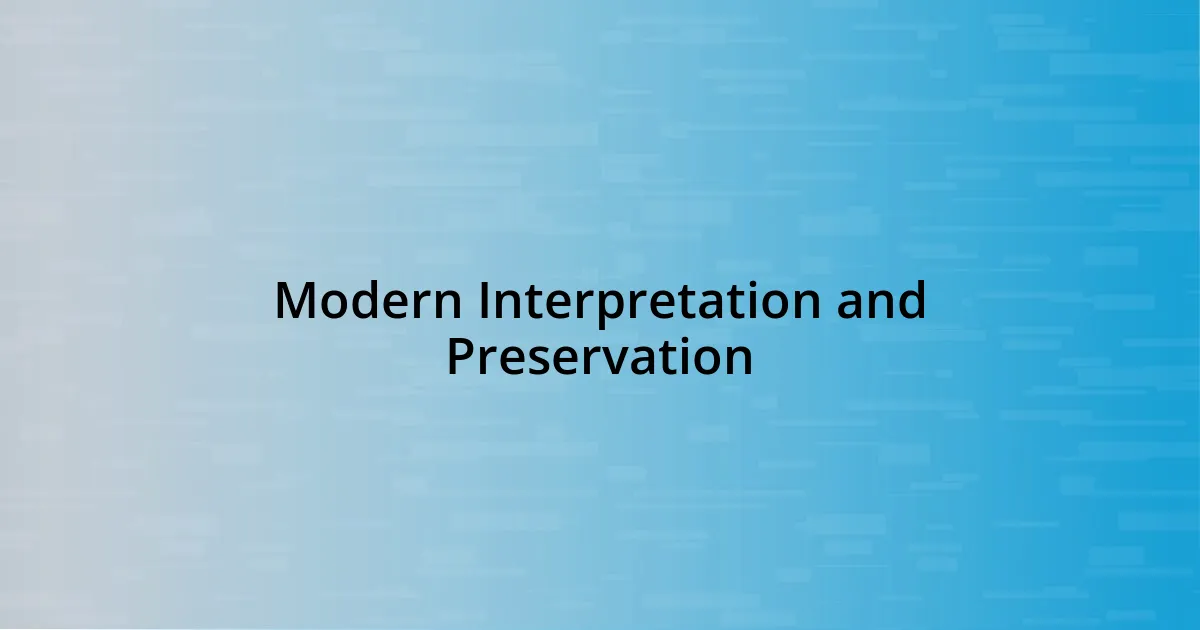
Modern Interpretation and Preservation
Modern interpretations of African American musical heritage reflect a vibrant blend of tradition and innovation. I often find myself captivated by how newer artists pay homage to the past while forging their unique paths. For instance, when I listen to contemporary R&B artists who infuse their melodies with classic soul influences, I can’t help but appreciate the reverence they show toward legends like Marvin Gaye and Whitney Houston. It begs the question: how do we maintain the essence of a genre while inviting fresh perspectives?
Preservation efforts are equally vital in keeping this heritage alive. I recall visiting a local festival that celebrated African American music, where not only were established acts performing, but younger musicians were also given the stage. Seeing them reinterpret elements of blues and jazz added a layer of excitement. It’s a reminder that the legacy of African American music not only thrives but transforms with each generation, as they weave their stories and emotions into the fabric of these rich genres.
Moreover, educational initiatives play a pivotal role in this preservation. I’ve participated in workshops aimed at teaching young musicians about the cultural significance of their musical roots. It’s inspiring to see their eyes light up when they connect the dots between historical struggles and musical expression. This engagement isn’t just preservation; it’s about fostering an appreciation for a legacy that invites ongoing dialogue and exploration. How can we ensure these conversations continue in the future? By empowering the next generation with knowledge and tools to express their own narratives through music.





